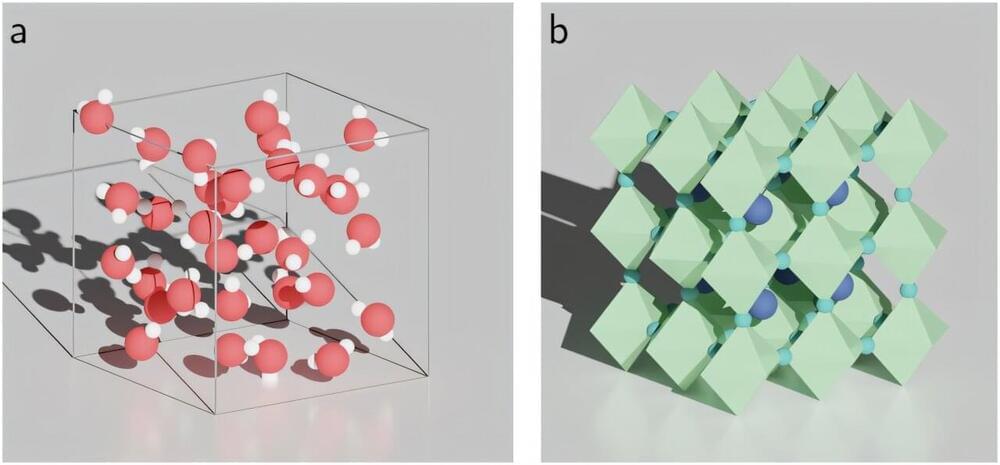The universe is a strange place on very small scales.




Researchers with the Advanced Science Research Center at the CUNY Graduate Center (CUNY ASRC) have unveiled a critical mechanism that links cellular stress in the brain to the progression of Alzheimer’s disease (AD).
The study, published in the journal Neuron, highlights microglia, the brain’s primary immune cells, as central players in both the protective and harmful responses associated with the disease.
Microglia, often dubbed the brain’s first responders, are now recognized as a significant causal cell type in Alzheimer’s pathology. However, these cells play a double-edged role: some protect brain health, while others worsen neurodegeneration.

Whenever a sink overflows, the flooding is usually caused by a blockage that has built up in the drains. Similarly, as we age, our bodies are flooded by aging, or senescent cells, which have stopped dividing but, instead of dying, remain active and build up in body tissues. Recent studies have shown that getting rid of these cells might delay age-related diseases, reduce inflammation and extend lives. Despite the great potential, however, there is currently no drug that can target these cells directly and efficiently.
Now, Weizmann Institute of Science researchers suggest an alternative approach. In a new study published in Nature Cell Biology, they reveal that senescent cells build up in the body by clogging up the immune system, thereby preventing their own removal.
The scientists demonstrated in mice how to unclog this blockage using immunotherapy, the new generation of treatments that is revolutionizing cancer therapy. These findings could pave the way for innovative treatment of age-related diseases and other chronic disorders.
The direct fusion drive could cut travel to Saturn’s moon Titan to just 2 years. Here is some key information for you to watch before deciding to read the whole article. Thanks for visiting us!
Fusion Power for Fast Space Travel
Scientists at Princeton Plasma Physics Laboratory (PPPL) are developing a groundbreaking propulsion system called the Direct Fusion Drive (DFD) that could drastically cut down travel time to distant planets. Using this innovative technology, spacecraft could reach Saturn’s moon Titan in just two years, compared to the many years it currently takes. Titan, with its hydrocarbon-rich surface, holds significant scientific interest and may even serve as a future refueling stop for interplanetary missions.

Here’s one definition of science: it’s essentially an iterative process of building models with ever-greater explanatory power.
A model is just an approximation or simplification of how we think the world works. In the past, these models could be very simple, as simple in fact as a mathematical formula. But over time, they have evolved and scientists have built increasingly sophisticated simulations of the world as new data has become available.
A computer model of the Earth’s climate can show us temperatures will rise as we continue to release greenhouse gases into the atmosphere. Models can also predict how infectious disease will spread in a population, for example.
Anyone who has dealt with ants in the kitchen knows that ants are highly social creatures; it’s rare to see one alone. Humans are social creatures too, even if some of us enjoy solitude. Ants and humans are also the only creatures in nature that consistently cooperate while transporting large loads that greatly exceed their own dimensions.
Prof. Ofer Feinerman and his team at the Weizmann Institute of Science have used this shared trait to conduct a fascinating evolutionary competition that asks the question: Who will be better at maneuvering a large load through a maze? The surprising results, published in the Proceedings of the National Academy of Sciences, shed new light on group decision making, as well as on the pros and cons of cooperation versus going it alone.
To enable a comparison between two such disparate species, the research team led by Tabea Dreyer created a real-life version of the “piano movers puzzle,” a classical computational problem from the fields of motion planning and robotics that deals with possible ways of moving an unusually shaped object—say, a piano—from point A to point B in a complex environment.

The manic pace of sharing, storing, securing, and serving data has a manic price—power consumption. To counter this, Virginia Tech mathematicians are leveraging algebraic geometry to target the inefficiencies of data centers.
“We as individuals generate tons of data all the time, not to mention what large companies are producing,” said Gretchen Matthews, mathematics professor and director of the Southwest Virginia node of the Commonwealth Cyber Initiative. “Backing up that data can mean replicating and storing twice or three times as much information if we don’t consider smart alternatives.”
Instead of energy-intensive data replication, Matthews and Hiram Lopez, assistant professor of mathematics, explored using certain algebraic structures to break the information into pieces and spread it out among servers in close proximity to each other. When one server goes down, the algorithm can poll the neighboring servers until it recovers the missing data.

Many techniques in computational materials science require scientists to identify the right set of parameters that capture the physics of the specific material they are studying. Calculating these parameters from scratch is sometimes possible but costs a lot of time and computational power. Consequently, scientists are always eager to find more efficient ways to estimate them without doing the full calculation.
This is the case for Koopmans functionals, a promising approach to expand the power of density-functional theory so that it can be used to predict the spectral properties of materials (such as what frequencies of light a material absorbs), and not just their ground state (such as the optimal positions of the atoms in that material). The accuracy of Koopmans functionals relies on finding the right “screening parameters” for the system one is studying.
“You can interpret the screening parameters as the degree to which the rest of the electrons in a system react to the addition or removal of an electron,” explains Edward Linscott, a postdoc at the Center for Scientific Computing, Theory and Data of the Paul Scherrer Institute, and member of MARVEL.

Quantum sensing is a rapidly developing field that utilizes the quantum states of particles, such as superposition, entanglement, and spin states, to detect changes in physical, chemical, or biological systems. A promising type of quantum nanosensor is nanodiamonds (NDs) equipped with nitrogen-vacancy (NV) centers. These centers are created by replacing a carbon atom with nitrogen near a lattice vacancy in a diamond structure.
When excited by light, the NV centers emit photons that maintain stable spin information and are sensitive to external influences like magnetic fields, electric fields, and temperature. Changes in these spin states can be detected using optically detected magnetic resonance (ODMR), which measures fluorescence changes under microwave radiation.
In a recent breakthrough, scientists from Okayama University in Japan developed nanodiamond sensors bright enough for bioimaging, with spin properties comparable to those of bulk diamonds. The study, published in ACS Nano, on 16 December 2024, was led by Research Professor Masazumi Fujiwara from Okayama University, in collaboration with Sumitomo Electric Company and the National Institutes for Quantum Science and Technology.